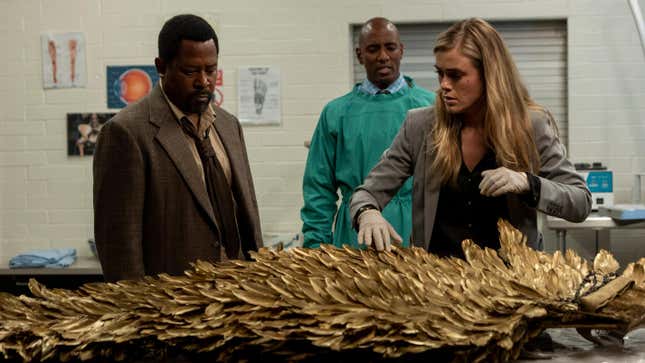
Cinematic inspirations, even when worn unabashedly on the outer level, are not in and of themselves a bad thing. After all, who hasn’t at some point enjoyed the cover version of a song more than the original? But when those inspirations feel not only obvious, but also executed with so little additional flair, narrative reframing, or even energy, the general effect can be one of emotional imprisonment.
Witness the serial killer mystery Mindcage (in theaters December 16), a genre slog which reaches back very specifically to a handful of 1990s thrillers—most notably The Silence Of The Lambs and the supernaturally inflected Fallen, starring Denzel Washington, as well as an additional pinch of Seven—to wildly diminishing effect. The end result is a movie whose chief entertainment value may come from taking an inventory of the different ways its various characters pronounce the name of its imprisoned, assistive madman.
Set in Arkansas, Mindcage opens on a colorfully nicknamed serial killer with a fondness for doing charcoal pencil sketches in his sprawling private cell. Over the course of five years, Arnaud “The Artist” Lefeure (John Malkovich) killed six women, painstakingly decorating and posing their bodies in elaborate, quasi-religious public displays, before being finally apprehended and sentenced to death.
Now, years later, an apparent copycat is continuing his work. As the victim total rises, Jake Doyle (Martin Lawrence), the man who caught Lefeure, and his new partner Mary Kelly (Melissa Roxburgh) turn to the Artist for help in stopping the murders. To avoid triggering Lefeure’s resentments toward Doyle, Kelly is the designated point of contact. As she is repeatedly harassed by a seemingly vagrant man (Chris Mullinax), Kelly tries to piece together labyrinthine clues that will stop the killing.
Director Mauro Borrelli, whose filmography encompasses work as an illustrator on many big-budget productions in addition to plenty of low-budget horror and other genre offerings behind the camera, evinces no particularly notable or elevating authorial perspective. Instead he merely embraces an apparent “make-the-day” efficiency as his point-of-view.
Visually, it would not be difficult to achieve a grimy, Southern Gothic aesthetic, but Mindcage’s look is depressingly generic; its cars are too clean, its rooms too tidy and freshly painted. This is an instance of a location shoot (the film also shot in Arkansas) coming to town and then failing to take advantage of the local environment and any of its distinctive flavors, which could have helped give the movie a differentiating feel.
It is the script, however, which is the film’s real offender. From a story credited to Borrelli, screenwriter Reggie Keyohara III crafts a blockishly plotted work, devoid of color and populated by characters with no depth. He also uncorks some howlingly bad dialogue. When Kelly finds a bottle of nail polish on one body, she immediately identifies it as a discontinued line from her youth, saying, “My father hated me for wearing it.” Later, when a small arrow is found protruding from the fingernail of another victim, Doyle swears it connects to his old partner, solemnly intoning, “This is a needle from an antique compass. I never saw him without it.”
The movie’s core idea, which it eventually gets around to in its final 15 or 20 minutes, isn’t at all a bad one. But the uninspired plotting is utterly cut-and-paste from the aforementioned movies, from an appropriation of archangel philosophizing and a ticking clock involving a kidnapped politician to a tête-à-tête in which the Artist, after a florid monologue about the corruptibility of the human mind, grills Kelly about recurring nightmares from her adolescence.
The movie’s casting, and its nominal upending of expectation in this regard, represents a vast reservoir of unfulfilled potential. Kelly is the story’s junior detective, but very much a driving force in the investigation, and not just the movie’s POV character. While the script does her no favors, Roxburgh is also very much out of her depths, failing to believably convey any internalized nuance stemming from Kelly’s complicated past. Lawrence, for his part, never seems remotely interested in seizing the opportunity to redefine what audiences think of him. He plods through numerous sequences as if they’re little more than blocking rehearsals or table reads, and manages to render a scene silly when he only halfheartedly commits to slamming his fist on a table.
Only Malkovich, who gives an amusingly low-energy performance, locates something approaching an actual character. He no doubt senses the limitations of this material, yes. But in that recognition lies the beauty of a smart and intuitive actor—not phoning in a performance, but putting on it a spin which counterbalances (some of) the rest of a movie’s failings. When Malkovich talks about the irrelevance of his character’s physical imprisonment, and freedom existing in his mind, one totally believes him.
If there’s any other noteworthy element to the movie, it comes, perversely enough, in the form of Mindcage’s posed victims. While the rest of the production design feels largely incongruous with the story being told, the ornately costumed and made-up figures are legitimately mesmerizing, each their own little objet d’art. Of course, if dead bodies are the thing in a movie which elicit the most feeling, that’s probably not a good sign.